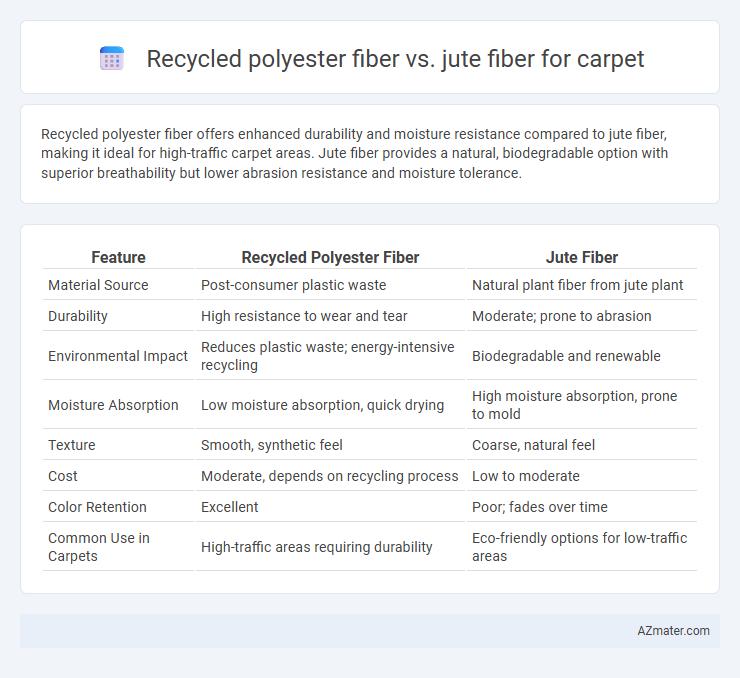Recycled polyester fiber offers enhanced durability and moisture resistance compared to jute fiber, making it ideal for high-traffic carpet areas. Jute fiber provides a natural, biodegradable option with superior breathability but lower abrasion resistance and moisture tolerance.
Table of Comparison
| Feature | Recycled Polyester Fiber | Jute Fiber |
|---|---|---|
| Material Source | Post-consumer plastic waste | Natural plant fiber from jute plant |
| Durability | High resistance to wear and tear | Moderate; prone to abrasion |
| Environmental Impact | Reduces plastic waste; energy-intensive recycling | Biodegradable and renewable |
| Moisture Absorption | Low moisture absorption, quick drying | High moisture absorption, prone to mold |
| Texture | Smooth, synthetic feel | Coarse, natural feel |
| Cost | Moderate, depends on recycling process | Low to moderate |
| Color Retention | Excellent | Poor; fades over time |
| Common Use in Carpets | High-traffic areas requiring durability | Eco-friendly options for low-traffic areas |
Introduction to Recycled Polyester Fiber and Jute Fiber
Recycled polyester fiber, derived from post-consumer plastic bottles or industrial polyester waste, offers durability, stain resistance, and eco-friendly appeal for carpet manufacturing. Jute fiber, a natural plant fiber harvested from the jute plant, is biodegradable, breathable, and provides a rustic texture ideal for sustainable carpets. Both fibers serve unique market demands, with recycled polyester focusing on synthetic resilience and jute emphasizing renewable natural material benefits.
Environmental Impact: Recycled Polyester vs Jute
Recycled polyester fiber for carpets significantly reduces plastic waste by repurposing PET bottles, lowering fossil fuel consumption and greenhouse gas emissions compared to virgin polyester. Jute fiber, a natural and biodegradable material, has a minimal carbon footprint due to its renewable cultivation process and ability to enrich soil quality. However, recycled polyester offers enhanced durability and moisture resistance, while jute excels in compostability and lower water usage during production.
Production Process of Recycled Polyester Fiber
Recycled polyester fiber production begins with collecting and sorting plastic waste, primarily PET bottles, which are then cleaned and shredded into flakes. These flakes undergo melting and extrusion to form continuous filaments or staple fibers suitable for carpet manufacturing. This energy-efficient process significantly reduces reliance on virgin petroleum resources and minimizes environmental impact compared to traditional polyester fiber production.
Manufacturing Journey of Jute Fiber
The manufacturing journey of jute fiber for carpets begins with harvesting the jute plant, followed by retting, which involves soaking the stalks in water to separate the fibers. These fibers are then stripped, washed, and dried before being spun into yarn suitable for weaving durable, eco-friendly carpets. Unlike recycled polyester fiber, which relies on energy-intensive processing of plastic waste, jute manufacturing emphasizes natural, low-impact methods that reduce carbon footprint and promote biodegradability.
Durability and Lifespan Comparison
Recycled polyester fiber offers superior durability and a longer lifespan compared to jute fiber, with excellent resistance to wear, moisture, and stains, making it ideal for high-traffic carpet applications. Jute fiber, though biodegradable and eco-friendly, tends to degrade faster due to lower resistance to moisture and abrasion, resulting in a shorter lifespan in comparison. Carpets made from recycled polyester can last up to 10-15 years, whereas jute fiber carpets typically last around 3-5 years under similar conditions.
Comfort and Texture Differences
Recycled polyester fiber offers a soft, smooth texture with enhanced durability and stain resistance, making carpets comfortable underfoot and easier to maintain. Jute fiber provides a coarser, natural texture that is breathable and eco-friendly but less cushioned, often resulting in a firmer surface feel. The contrast in comfort stems from recycled polyester's synthetic softness versus jute's organic roughness and rigidity.
Cost Analysis: Recycled Polyester vs Jute
Recycled polyester fiber generally offers a lower cost per square yard compared to jute fiber, driven by its mass production and availability from post-consumer plastics. Jute fiber, while eco-friendly and biodegradable, tends to have higher raw material and processing expenses due to its agricultural sourcing and limited supply chain scalability. Cost analysis reveals that recycled polyester enables more competitive pricing in carpet manufacturing, especially for large-scale projects prioritizing budget and durability.
Maintenance and Cleaning Requirements
Recycled polyester fiber carpets require low maintenance, resisting stains and moisture, making them easy to clean with regular vacuuming and occasional spot treatment using mild detergents. Jute fiber carpets are highly absorbent and prone to moisture damage, requiring careful spot cleaning with dry methods and avoiding excessive water to prevent mold and fiber weakening. Both materials benefit from immediate spill response, but recycled polyester offers greater durability and longevity under frequent cleaning conditions.
Aesthetic Appeal and Design Versatility
Recycled polyester fiber offers a sleek, uniform appearance with consistent color retention, making it ideal for modern carpet designs that demand vibrant and long-lasting hues. Jute fiber provides a natural, rustic aesthetic with its coarse texture and earthy tones, lending warmth and organic charm to traditional and eco-friendly carpets. Design versatility is higher with recycled polyester due to its ability to be easily dyed and manipulated into various patterns, while jute's limited color range and texture focus placement on natural and minimalist styles.
Choosing the Right Fiber for Sustainable Carpets
Recycled polyester fiber offers durability, stain resistance, and moisture-wicking properties, making it a popular choice for sustainable carpets in high-traffic areas. Jute fiber, derived from natural plant sources, is biodegradable and promotes eco-friendliness with its low environmental impact and natural texture. Selecting the right fiber depends on balancing performance requirements, environmental goals, and lifecycle considerations to achieve truly sustainable carpet solutions.

Infographic: Recycled polyester fiber vs Jute fiber for Carpet
 azmater.com
azmater.com